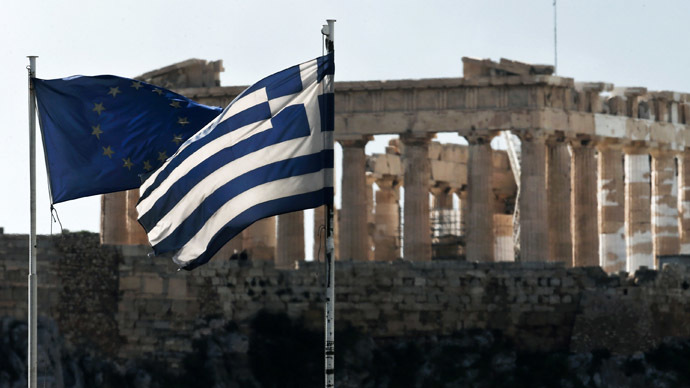‘Grexit may cause domino effect, but should Greece stay in?’

It’s wrong to say Greece must stay in the eurozone. If it left, the market would be free of a restrictive ‘one-size-fits-all' straightjacket policy, said Richard Wellings of the Institute of Economic Affairs.
The President of the EU Commission Jean-Claude Juncker has questioned the future of the euro. He warned that should Greece leave the eurozone “the Anglo-Saxon world, will try everything to break down the euro area piece by piece, bit by bit.”
RT:So Jean-Claude Juncker says London and Wall Street would rip the euro apart if Greece left. Do you believe him, and how would that happen?
Richard Wellings: There is a danger of a domino effect: if Greece were to leave the eurozone than some of the financial markets might think then maybe Spain, Portugal, or Italy could be next, and they would then drive at the bond yields and make it more and more expensive for these governments to service their debts. The question then will be whether the European Central Bank will move in to bail them out yet again, or whether German tax payers finally say: “We’ve had enough, just let them go!” I think he has a point there but clearly these were ill-judged remarks and they were obviously going to be misinterpreted.

RT: Juncker's not exactly on the best of terms with the British government, and from his comments, doesn't that suggest things are only getting worse? What do you think?
RW: I think that shows this huge gulf in the political culture between the Anglo-Saxon countries and continental Europe, with the continentals much more skeptical about free markets and the financial sector settlement, and so forth.
Having said that, it’s obvious that in some of his other comments he seemed to have opened the door to some kind of re-negotiation with the UK. So it is a mixed bag, and there was some comfort for the UK commentators as well.
READ MORE: London bankers plotting to bring down the Eurozone, says Juncker
RT:So Juncker's saying Greece has to stay in the eurozone. So why are its international creditors, the so-called Troika, making that so difficult?
RW: Clearly there are different interests here. I think it’s wrong to say that Greece must stay in the eurozone. In a sense the market could help some of these countries if they pushed them out because they will be freed of this restricted straightjacket of ‘one size fits all’ management policy- this led to this extreme boom and bust prolonged depression and very, very severe social problems. So the markets could help these countries. The EU could move back to a looser more flexible union that we had before the eurozone was formed in the late 1990’s. ... This is going to be a disaster for the EU. Of course the EU elites don’t see any reverse gear; it’s all about expanding and making it an even closer union.
The statements, views and opinions expressed in this column are solely those of the author and do not necessarily represent those of RT.
The statements, views and opinions expressed in this column are solely those of the author and do not necessarily represent those of RT.












